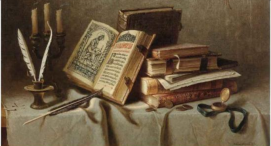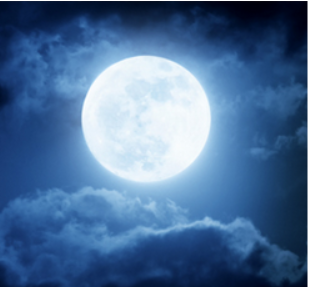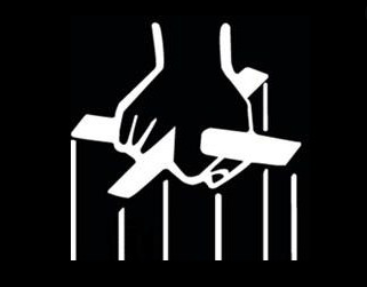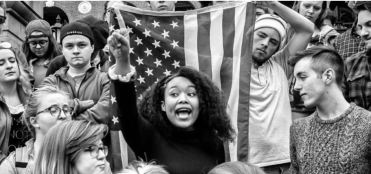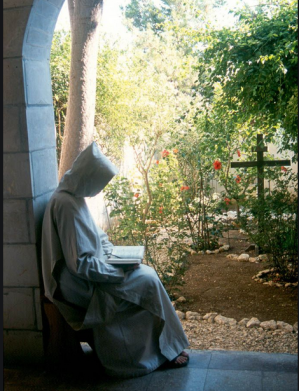He woke gasping for air, his mind reeling in a jumbled panic, as if tossed and winnowed by a strong wind. Drops of sweat from his forehead fell into his eyes, stinging, and his vision blurred. A quick glance toward his wife and child, huddled next to him for warmth, reassured him they were safe, but a feeling of unease clung to his heart, like smooth bark to a tree. His wife was restless: her head rolled irritably from side to side, and her lips were moving, but he heard no words.
He listened for sounds in the dark – thieves, soldiers, evil spirits – but heard only the night sounds of the livestock. Then, in his brain, the noise began again. From the base of his neck it grew upward, becoming more urgent, louder, fiercer. The thrumming of angry bees! Cries of alarm! Shouts of pain and shrieks of fear! Stop! Stop!
He leapt up and clasped his head with his rough hands, his heart pounding and his breath ragged. What was happening to him? What did it mean? Suddenly, the noise dimmed, and he heard a command.
“You must flee. Take the child and his mother and flee!”
He spun around. “What? Why?” The sound of screams rose again in his brain. “Who is there?” Silence. “She just gave birth,” he pleaded.
“Flee. Take the child and flee!” The voice commanded. “Now!”
He heard a small cry behind him. He turned and saw his wife staring at him with wide eyes. “We must leave,” she said, “they are coming for the child.” Her breasts rose and fell as rapidly as the ribs of a young deer winded after a long chase.
“What? Who? I hear no one.” At least, no one who is outside of my head. He walked to the half-door and peered into the darkness. “No one is here.”
“They are coming,” she replied, her voice quavering. “I heard their voices.”
“Perhaps in the …” he began, but the noise returned, blocking all thought. Shouts, curses, screams, dogs barking, babies crying. And a feeling, a feeling of deep despair, a feeling of all the horror and injustice that slashed across so many lives. He put his hands over his ears. “The noise! The noise!” He stopped himself, unsure if he cried out loud, but his wife said nothing. He staggered over to their belongings. “Okay! Okay! We’ll leave now.”
He hurriedly gathered their few possessions and stuffed them into a rough sack. Into another, he poured a measure of grain and filled the remaining space with hay. He found two empty jars that he filled with water from the animal’s trough. It would have to do.
“Are you sure you can do this?” He asked his wife. “The birth … just yesterday.” He did not know what else to say.
“Yes,” she said. “I must do it.”
He tied the two bags to the donkey, making a rough saddle. He stuffed cloth into the mouths of the water jars, then looped string around their necks before placing them carefully across the donkey’s back.
“Come,” he said to his wife. “Let me help you onto the beast.” She clutched the baby with both hands as he picked them up and gently settled them onto the donkey’s back. “We are ready.”
“Yes,” she said, “we must go.”
They left the small, crude building, precariously constructed of layers of irregular, unfaced stone, and walked along the narrow dirt road through the village. Small explosions of dust shot up around each footstep, then abruptly returned to the ground. All was quiet until they reached the village’s southern edge; then, as if tormented by the Evil One, dogs began to bark and howl, making a fearsome noise.
“The soldiers are here!” His wife said in a strained voice that was half whisper, half smothered scream. “We must hurry!”
“We’ll move away from the road,” he replied, tugging the donkey’s rope to the right and plunging them all into the trackless wasteland. “We’ll stay away from the road,” he repeated, as if convincing himself that safety waited in the wilderness.
They continued in silence, heading south and west over rough ground. He willed more distance between them and the village, but distance was slow in coming amid the rocks and sand. Behind them, they could hear rough voices, the sound of doors kicked in, the shouts of men and the shrieks of women. “Faster,” he thought to himself, “we must go faster. We must get away from the noise!” He pulled harder on the donkey’s rope, causing the animal to make a few wild, lurching strides before settling back into a comfortable gait.
His wife admonished him: “Steady.”
Slowly, ever so slowly, the voices from the village faded, and the incessant thrum of sound in his brain diminished.
They walked for a long time, and he lost a clear sense of the direction in which they were moving; the night sky was filled with clouds, so he could see neither moon nor stars. He remained alert, every nerve a snare, his eyes scanning the black desert night, his heart thumping with dread. Dread of what? He didn’t know. Serpents. Lions. Soldiers. Wild dogs. Evil spirits. Dread. Dread. Dread. Every breath a strangled cry for help.
The baby stirred once, and his wife nursed him.
Later, when even his dread was exhausted, she spoke: “I bleed.” Her voice was faint, the sound of a small bird on the other side of a sandy hill on a windy day.
“What?” He mumbled. The noise, the voices, even diminished, had beaten his brain into a stupor. “Bleeding? Why?” He stopped and looked at her dumbly.
“From the birth.” Her voice was tiny, as if it took great effort to make the smallest sound. “There is cloth in the bag. I need it.”
“Cloth,” he repeated. He dropped the donkey’s rope and went to the bag. He stood there for a few seconds, staring at the bag, before remembering what he needed to do. Slowly – his fingers were thick and stiff – he untied the bag and rummaged through it until he found a few pieces of cloth. “These?” He asked, holding them up as if she could see them in the dark.
“Yes. Take the baby.” She held the child out to him.
He took the baby into his arms. It was too dark to make out the child’s face, but he felt alarmingly light, as if he might float away. He stood beside his wife in the dark, grimly holding the baby onto the earth, half-afraid that his thick, clumsy fingers might scar the newborn’s delicate skin.
Without leaving the donkey’s back, his wife quickly secreted the cloth beneath her clothes. “I am ready,” she said.
“Do you need to rest?” He asked, anxious for her and the child. He looked toward her face. He could see little in the dark, but she seemed to be shaking. “Do you need to drink?”
“We cannot rest yet. The women are still crying out.” She did not explain how she knew this, or its significance.
He gave her the baby, re-tied the bag, then picked up the donkey’s rope and resumed walking. His feet hurt and were difficult to lift, as if he were carrying a heavy tree trunk up a steep hill; he stumbled a few times but caught himself. “It’s important not to fall,” his delirious brain warned his legs, “because you won’t be able to get up without help, and there is no help out here.” He was thirsty but did not drink; his wife would need the water to produce milk for the child.
Surely, he thought, the sun will soon rise. But the night remained dark. Surely, he thought, there will be a village where they can rest. But there was no village. Surely, he thought, God will help them. But God was silent.
Hours and hours into the deadening, silent walk the wind began to blow. Sand peppered his face. He looked back at his wife. She held the child wrapped in her garments with one hand and was leaning forward, her head down near the donkey’s neck, grasping the beast’s mane with her other hand. He turned to look ahead, but his eyes were filled with dust and sand. He looked down, concentrating on each step as if the next one, just one more, would magically bring them to a village. But there was only sand, blowing sand, and his feet were blending into the sand, becoming sand. The voices in his head were legion, growing louder and louder and louder, conspiring with the wind and sand to overwhelm his senses. He had a vision of terrifying beings flying through a cacophony of lamentations, of sounds made visible. He heard, or sensed, sound coming from behind them, rolling faster and faster across the sand from the north. What to do? Where to hide? He stopped, panicked, confused, and then felt himself being lifted up on a great wave of wailing. The donkey’s rope slipped from his hand.
“My wife!” He shouted. “The baby!”
He heard the voice of a rabbi from his childhood, reciting words as chilling to his young ears then as they were now.
“A voice is heard in Ramah, mourning and great weeping, Rachel weeping for her children and refusing to be comforted, because they are no more.”
“No!” He cried aloud, but everything went black and silent.
He did not know how much time had passed, but when he recovered from the fall, the sun had just breached the eastern horizon. Surely, he must have fallen a great distance, for he had been carried high into the air, three times higher than any building in their home village, by the black rolling wave of sound. He thought of his wife and child and quickly rolled over to look for them.
He found them, sitting next to him, keeping watch. And although he was safe in his mother’s arms, the baby began to cry.

 My friend’s general point about the importance of books and opinions is well-taken; Donald Trump is a perfect example of what happens when a person doesn’t read. But I’m not inclined to dismiss the opinions of everyone who hasn’t read very much. I’ve known some wise old men and wise old women who were not great readers. They usually limited their opinions to their experiences or to the experiences of people they knew – and even then, they spoke of concrete behaviors or of ordinary human joy and sadness. Sometimes they told stories, folklore, that were a reservoir of insight. If they did extrapolate to larger issues, it was based on a simple moral code or common sense; sadly, those tools are sometimes as ill-fitting for the situation at hand as a horse and buggy would be on the runway at the airport. One of the valuable things about books is they expand awareness beyond individual experience, beyond simple moral codes and what passes for common sense, allowing us to better appraise a situation.
My friend’s general point about the importance of books and opinions is well-taken; Donald Trump is a perfect example of what happens when a person doesn’t read. But I’m not inclined to dismiss the opinions of everyone who hasn’t read very much. I’ve known some wise old men and wise old women who were not great readers. They usually limited their opinions to their experiences or to the experiences of people they knew – and even then, they spoke of concrete behaviors or of ordinary human joy and sadness. Sometimes they told stories, folklore, that were a reservoir of insight. If they did extrapolate to larger issues, it was based on a simple moral code or common sense; sadly, those tools are sometimes as ill-fitting for the situation at hand as a horse and buggy would be on the runway at the airport. One of the valuable things about books is they expand awareness beyond individual experience, beyond simple moral codes and what passes for common sense, allowing us to better appraise a situation.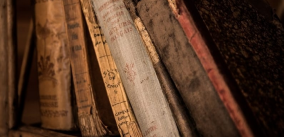
 Books of fiction allow me to imagine the minds and souls of people making decisions under duress. The people in a novel might be different than me, they might be more likeable or less likeable, but their human experiences are my experiences, actually or potentially, and I can learn from them. Perhaps the imaginative freedom – it’s me but it’s not me – fiction offers can help me develop empathy for others; perhaps that empathy will modify my notions of what is right and wrong; perhaps that will help me to look more kindly on others.
Books of fiction allow me to imagine the minds and souls of people making decisions under duress. The people in a novel might be different than me, they might be more likeable or less likeable, but their human experiences are my experiences, actually or potentially, and I can learn from them. Perhaps the imaginative freedom – it’s me but it’s not me – fiction offers can help me develop empathy for others; perhaps that empathy will modify my notions of what is right and wrong; perhaps that will help me to look more kindly on others.